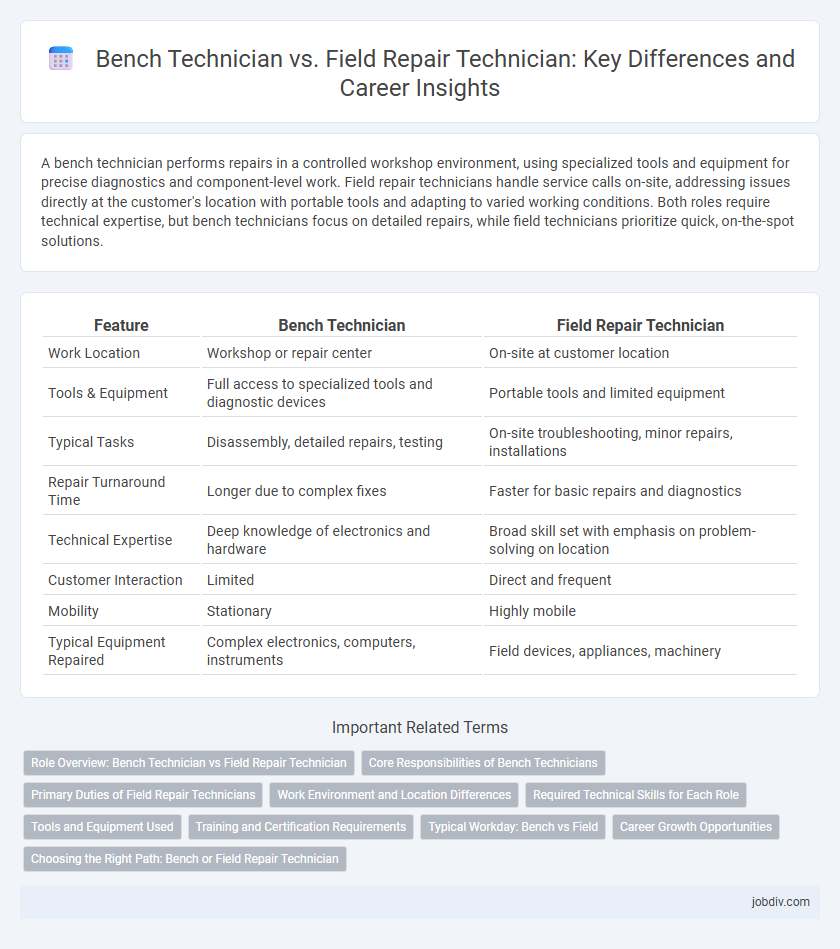A bench technician performs repairs in a controlled workshop environment, using specialized tools and equipment for precise diagnostics and component-level work. Field repair technicians handle service calls on-site, addressing issues directly at the customer's location with portable tools and adapting to varied working conditions. Both roles require technical expertise, but bench technicians focus on detailed repairs, while field technicians prioritize quick, on-the-spot solutions.
Table of Comparison
| Feature | Bench Technician | Field Repair Technician |
|---|---|---|
| Work Location | Workshop or repair center | On-site at customer location |
| Tools & Equipment | Full access to specialized tools and diagnostic devices | Portable tools and limited equipment |
| Typical Tasks | Disassembly, detailed repairs, testing | On-site troubleshooting, minor repairs, installations |
| Repair Turnaround Time | Longer due to complex fixes | Faster for basic repairs and diagnostics |
| Technical Expertise | Deep knowledge of electronics and hardware | Broad skill set with emphasis on problem-solving on location |
| Customer Interaction | Limited | Direct and frequent |
| Mobility | Stationary | Highly mobile |
| Typical Equipment Repaired | Complex electronics, computers, instruments | Field devices, appliances, machinery |
Role Overview: Bench Technician vs Field Repair Technician
Bench Technicians specialize in repairing electronic devices within a controlled workshop environment, utilizing advanced diagnostic tools and soldering equipment to handle intricate component-level repairs. Field Repair Technicians perform on-site troubleshooting and repairs, addressing equipment malfunctions directly at customer locations to minimize downtime and ensure operational continuity. Both roles require technical expertise but differ in their work settings and scope of responsibilities, with bench technicians focusing on precision repairs and field technicians emphasizing rapid problem resolution in diverse environments.
Core Responsibilities of Bench Technicians
Bench technicians specialize in diagnosing, repairing, and testing electronic equipment within a controlled workshop environment, using advanced diagnostic tools and software. They focus on component-level repairs, circuit board troubleshooting, and calibration to ensure devices meet precise operational standards. Their core responsibilities include detailed disassembly, fault isolation, soldering, and validating repairs before returning equipment to the field.
Primary Duties of Field Repair Technicians
Field Repair Technicians specialize in on-site troubleshooting, diagnostics, and repair of equipment, ensuring minimal downtime for clients. They perform routine maintenance, replace faulty components, and verify system performance directly at the customer's location. Their primary duties include rapid response to service calls, adapting to varied environments, and providing detailed reports on repairs and part replacements.
Work Environment and Location Differences
Bench technicians primarily operate within controlled workshop environments, equipped with specialized diagnostic tools and equipment to perform detailed repairs and testing on electronic devices. Field repair technicians work on-site at client locations or remote facilities, facing varied environmental conditions and relying on portable tools to troubleshoot and fix equipment. The contrasting work environments influence their daily routines, with bench technicians benefiting from stable, resource-rich settings, while field technicians require adaptability and problem-solving skills in dynamic, less predictable locations.
Required Technical Skills for Each Role
Bench technicians require proficiency in circuit board diagnosis, soldering, and component-level repair, emphasizing precision and detailed electronics expertise. Field repair technicians must possess strong troubleshooting abilities, knowledge of system integration, and adaptability to varied environments while handling on-site equipment repairs. Both roles demand a solid foundation in technical manuals, diagnostic software, and safety protocols ensuring effective and accurate repairs.
Tools and Equipment Used
Bench Technicians primarily use precision diagnostic tools, soldering irons, multimeters, and oscilloscopes to repair electronic components in a controlled workshop setting. Field Repair Technicians rely on portable diagnostic devices, hand tools, and specialized kits designed for on-site troubleshooting and repairs. Both roles require expertise in using advanced equipment tailored to their specific repair environments to ensure accurate and efficient service.
Training and Certification Requirements
Bench technicians typically require specialized training in diagnostic equipment and hands-on repair skills, often supported by certifications such as CompTIA A+ or manufacturer-specific credentials. Field repair technicians must possess broader certifications, including OSHA safety training and mobile troubleshooting certifications, to handle on-site repairs under varied conditions. Both roles demand continuous education to keep pace with evolving technologies and maintain certification validity.
Typical Workday: Bench vs Field
A Bench Technician typically works in a controlled workshop environment, diagnosing and repairing electronic devices using specialized tools and diagnostic equipment, often handling multiple units simultaneously. A Field Repair Technician travels to customer sites, performing on-site troubleshooting, maintenance, and repairs to minimize downtime and ensure equipment functionality in real-time. The bench setting emphasizes detailed component-level repairs, while fieldwork prioritizes rapid, practical solutions under varying environmental conditions.
Career Growth Opportunities
Bench Technicians typically experience career growth through specialization in diagnostics and complex component repair within controlled environments, leading to roles such as Senior Technician or Technical Trainer. Field Repair Technicians gain diverse hands-on experience by troubleshooting equipment in various settings, which can open pathways to supervisory positions or technical sales roles due to their customer interaction skills. Both career paths offer advancement, but Field Technicians often develop broader problem-solving abilities and client relationship expertise that enhance their leadership potential.
Choosing the Right Path: Bench or Field Repair Technician
Choosing between a bench technician and a field repair technician role depends on skill specialization and work environment preference. Bench technicians focus on detailed diagnostics and repairs in a controlled lab setting, utilizing precision tools and schematics for electronic devices. Field repair technicians excel in on-site troubleshooting and customer interaction, requiring adaptable problem-solving skills and the ability to work independently across various locations.
Bench Technician vs Field Repair Technician Infographic

 jobdiv.com
jobdiv.com